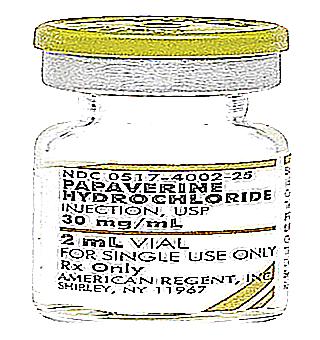Home >
Erectile Dysfunction >
Papaverine for impotence
Papaverine for impotence

Papaverine is a common drug that has antihypertensive, antispasmodic and vasodilatory effects. Although the pharmacological preparation does not belong to the category of narcotic drugs, by its chemical composition and origin it is an alkaloid of the opium poppy.
Composition and release forms of the medicinal product
The main active ingredient of this medication is papaverine hydrochloride. If the component composition of the drug contains a group of active ingredients, among which there is a papaverine compound, then this drug may be called Theodibaverin, Andipal and Papazol. Papaverine is traditionally produced by the manufacturer in 3 forms: 1. tablet formulation for oral administration; 2. suppositories, that is, suppositories for rectal administration; 3. injection. The composition of the excipients may vary depending on the manufacturer of the medicinal product. Manufacturers always indicate the exact composition and dosage of the ingredients in the instruction leaflet.
Indications for use
Papaverine is used as a vasodilator that stimulates the genitals after the diagnosis of erectile dysfunction. In addition, among the positive effects of a pharmacological agent, doctors note:
- decrease in the intensity of spasms of smooth muscle elements of the digestive system after the development of cholangitis, colitis and cholecystitis
- elimination of spastic pain that occurs during menstruation and irritable bowel syndrome, constipation and flatulence
- neutralization of the discomfort that occurs after cholecystitis
- easing renal pain and spasms with colic
- reducing the level of discomfort in the genitourinary system, when the patient has stones in the kidneys or in the urethra, cystitis and pyelitis
- pre-anesthetic preparation of patients before surgery
- elimination of bronchospasm
- treatment of angina pectoris, as well as spasms of cerebral and peripheral vessels arising from endarteritis
- elimination of pain and spasms of smooth muscles in the abdominal area
Pharmacological action
The therapeutic effects of a medicinal substance are manifested due to a decrease in the activity of some organic enzymes. Reception of a pharmacological agent causes a decrease in the tone of the smooth muscle elements of the internal organs. As a result of an increase in the level of muscle tension, internal organs (blood and lymph vessels, stomach and intestines, lungs and bronchi, gallbladder and urethra) contract. Muscle spasm occurs and the patient experiences discomfort. At the same time, the painful condition is accompanied by disturbances in the work of internal organs, in particular, a food lump is retained in the intestine, the bronchi lose their ability to conduct the required amount of air, and the mechanisms of bile secretion slow down. The drug allows you to reduce the overall muscle tone and neutralize spastic pains of varying intensity, restore the full functioning of internal organs. The vasodilator does not selectively relieve pain, but has a complex effect on all systems and internal organs. The drug has an effect on smooth muscles, but does not affect the striated sections, does not contribute to a change in the contractility of skeletal and cardiac muscles. Thus, the pharmaceutical substance relieves spasms and relaxes the muscles of internal organs and blood vessels without negatively affecting the activity of the myocardium. The action of the drug provides a mild decrease in blood pressure, a decrease in the degree of excitability of the heart muscle and a slowdown in the conduction of an impulse through the heart. Taking high dosages of the medication produces a sedative effect, a decrease in the activity of the central nervous system. The bioavailability of the drug is 54%. Myotropic antispasmodic binds to plasma proteins by 90%. It is well distributed in the body, quickly overcoming histohematogenous barriers. Complete metabolism of the drug is carried out within 24 hours.
Dosage
Papaverine is recommended to be taken in the dosage established by the attending physician. Adult patients can take 40 mg tablets three times a day. With the introduction of rectal suppositories, a single dosage of active ingredients is 10-20 mg.
Contraindications
Tablets, injections and suppositories with an analgesic effect are not recommended for use after diagnosis:
- individual intolerance
- glaucoma
- severe liver failure
- AV block
The drug is not prescribed for patients under 6 months of age and over 65 years old.



























